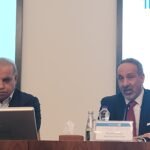Belem, Brazil, 22 Nov 2025
In a significant gathering at the 30th Conference of the Parties to the UN Climate Change Framework (COP30) in Belém, Brazil, a powerful call for climate justice was issued, framing the environmental crisis as a direct threat to fundamental human rights.
The appeal was made by His Excellency Mr. Sultan bin Hassan Al-Jamali, Secretary-General of Qatar's National Human Rights Committee (NHRC), during an expansive consultative forum titled "Climate Justice and the Responsibilities of National Human Rights Institutions." The event, held on November 19, 2025, and organized in cooperation with Qatar's Ministry of Environment and Climate Change, highlighted the urgent need for a global, binding agreement to protect human rights from the ravages of climate change.
Al-Jamali articulated a vision where the international community must unite to adopt a just climate framework. He stressed that without such cooperation—particularly through supporting the world's least developed nations—the effective enjoyment of human rights and the achievement of the 2030 Sustainable Development Goals would be in jeopardy. He argued for a multilateral approach that ensures accountability and provides tangible redress for communities already suffering from climate impacts.
This forum, he noted, was a direct reflection of the NHRC’s commitment to upholding the principles of the Doha Declaration on Climate Change and Human Rights, which was established in 2023. Al-Jamali painted a sobering picture of the cascading effects of a warming planet, linking it not just to environmental damage but to a surge in discrimination, the marginalization of vulnerable groups, rising poverty, and mass displacement. In the face of these compounded threats, he underscored the vital role that national human rights institutions must play. This includes integrating human rights into climate laws, monitoring violations, receiving complaints from affected individuals, and even pushing for climate litigation to ensure governments are held accountable.
The discussion was grounded in a stark, real-world example presented by His Excellency Dr. Jorge Augustos Nogueira, a Public Advocate from Brazil. He detailed the catastrophic floods that struck the state of Rio Grande do Sul in 2024, which impacted over 94% of its municipalities and more than a fifth of its population. In response, his office launched the "Rights Caravan" program, a mobile legal aid initiative designed to seek out and assist the most vulnerable victims, including indigenous and quilombola communities, who were disproportionately affected.
Dr. Nogueira shared valuable lessons from this frontline effort, noting that by proactively going into devastated communities, they could mediate conflicts and provide solutions without resorting to lengthy court battles. This model, supported by diligent data collection, demonstrated a flexible and human-centered approach to crisis recovery, proving that even in disaster, a commitment to justice can pave a path toward resilience and restoration.










